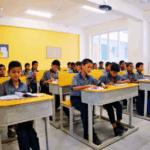Cases of parents taking children abroad without the other’s consent are growing in the UAE, with lawyers warning families about custody risks. Family custody lawyers say there is no clear legal process for relocating a child overseas, leaving parents facing tough legal battles.
The ‘Holiday Effect’ in Child Abduction Cases
Four years have passed since Indian expat A.S. last saw his two sons. What began as a brief trip to India turned into a permanent separation after his wife filed for divorce from abroad. “She left during the October midterm break, telling the kids it would be good to visit their grandparents,” he recalls. “I waved them goodbye at the airport and never saw them again. I didn’t want to drag them into a protracted legal battle.”
Experts describe this as a “holiday effect” — a situation where a parent takes a child overseas and does not return. Byron James, a partner at Expatriate Law, notes that these scenarios often surface during school breaks when one parent, typically the mother, travels abroad with the children for a short family visit but then decides not to come back. He adds that there is currently no established process in the Personal Status UAE Court for a parent to seek permission to relocate with a child overseas without the other parent’s consent. This gap feeds concerns about overseas abduction within the UAE, especially among expatriates.
In discussing the custodial dynamics, Maroun Abou Harb, Associate at BSA LAW, explains that UAE family law, influenced by Sharia principles, often treats mothers as the primary custodians of children up to certain ages—girls up to 13 and boys up to 11. This custodial pattern can lead to disputes when one parent aims to relocate a child internationally without the other’s agreement.
What to do
Byron emphasizes the need for expertise and speed if parental abduction is suspected. Choosing the right family custody lawyer is crucial because cases typically require coordination across two legal systems to secure the child’s return. Acting quickly is essential, as even a few weeks can significantly affect the legal and practical position; once a child settles in a new country, the challenge grows.
Maroun recommends filing a custody case in the UAE to establish custody rights under applicable personal or family law, ensuring formal recognition and creating a basis for protective measures. He also stresses reporting the situation to authorities, embassies, and police to document the abduction and mobilize assistance from local and diplomatic channels.
How to Stay Protected
Byron outlines several protective steps available in the UAE to reduce the risk of parental abduction:
- Advising on emergency travel bans to prevent unlawful international exit
- Preparing court applications seeking the return of a child
- Engaging with UAE immigration and airport authorities where appropriate
- Supporting the enforcement of existing custody and visitation orders
Maroun underlines the importance of executing clear legal custody agreements to ensure enforceable arrangements under UAE courts. He also reiterates the potential benefit of a formal process within the UAE for relocation orders, noting that developments under the Abu Dhabi Civil Family law Court could provide a transparent mechanism for these cases. If implemented and tested in practice, such a framework would help families in the UAE—whether in Dubai, Abu Dhabi, Sharjah, or other UAE cities—without resorting to actions taken without the other parent’s consent.








